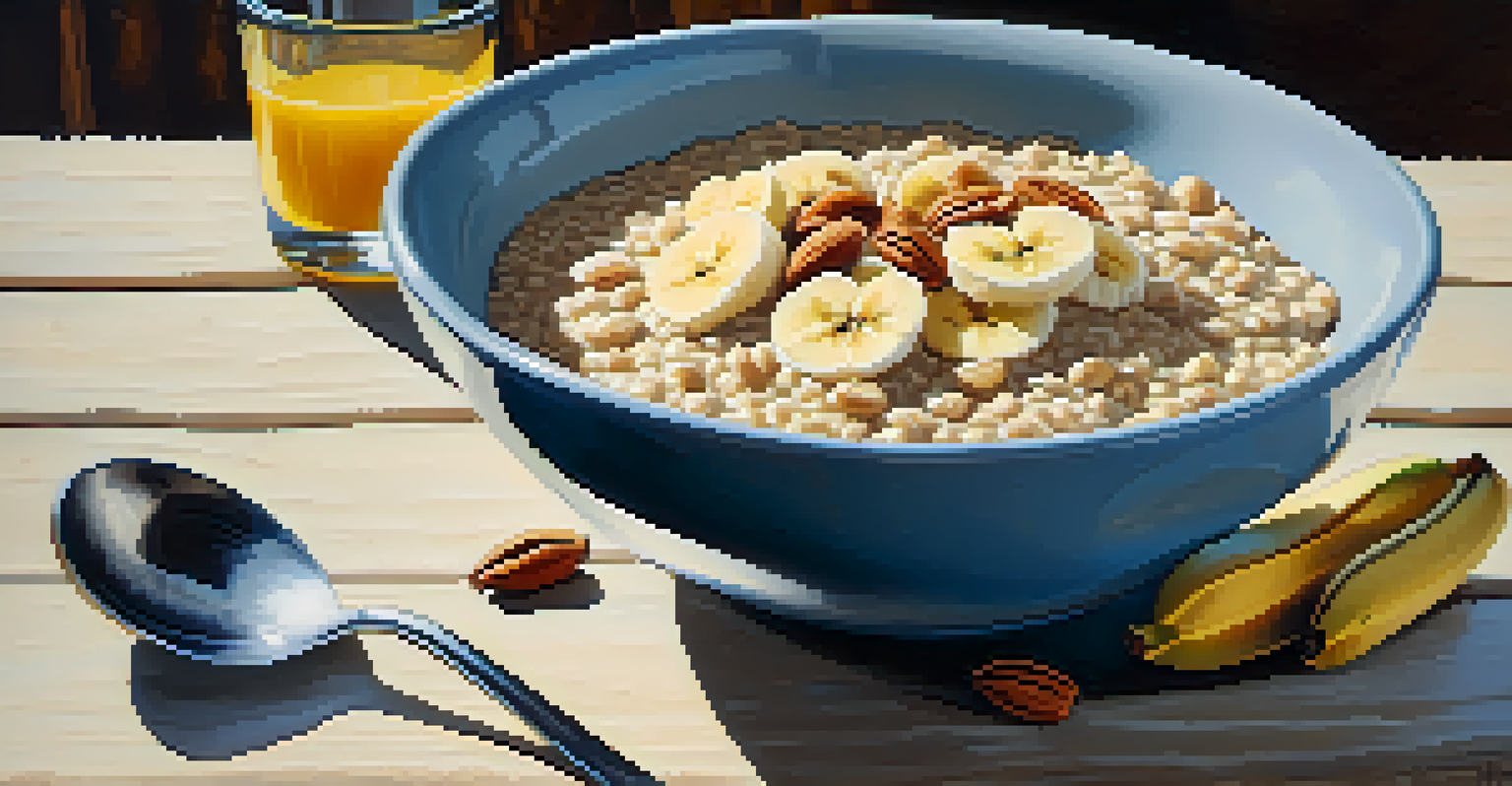The Importance of Fiber in Your Daily Nutritional Intake

What is Fiber and Why Do We Need It?
Fiber is a type of carbohydrate that our bodies can't digest. Unlike other carbohydrates that break down into sugar molecules, fiber remains intact and plays a crucial role in our digestive health. It's important to understand that there are two types of fiber: soluble and insoluble, each offering unique benefits.
The food you eat can be either the safest and most powerful form of medicine or the slowest form of poison.
Soluble fiber dissolves in water and can help regulate blood sugar levels and lower cholesterol. On the other hand, insoluble fiber adds bulk to your stool, helping food pass more readily through the digestive tract. Both types are vital for maintaining a balanced diet and supporting overall health.
Incorporating fiber into your daily intake can lead to a range of health benefits, including improved digestion, enhanced heart health, and better blood sugar control. By understanding the role of fiber, you can make informed choices about your nutrition.
Health Benefits of Consuming Adequate Fiber
Eating enough fiber is linked to a lower risk of chronic diseases. Studies show that a high-fiber diet can reduce the risk of heart disease by lowering cholesterol levels and improving blood pressure. Additionally, individuals who consume adequate fiber may have a reduced risk of type 2 diabetes.

Fiber also plays a significant role in weight management. High-fiber foods are often more filling, which can help curb overeating and reduce cravings. When you feel satisfied longer after a meal, it becomes easier to maintain a healthy weight.
Fiber is Essential for Health
Fiber plays a crucial role in digestive health and can help prevent chronic diseases.
Furthermore, fiber supports gut health by promoting regular bowel movements and preventing constipation. It acts as a prebiotic, feeding the beneficial bacteria in your gut, which can enhance your overall well-being and immune function.
Daily Fiber Recommendations by Age and Gender
The amount of fiber you need varies by age and gender. Generally, adult women should aim for about 25 grams of fiber per day, while adult men should target 38 grams. As children grow, their fiber needs increase, making it crucial to instill healthy eating habits early on.
Let food be thy medicine and medicine be thy food.
For example, teenage girls should aim for around 26 grams, while teenage boys should target about 31 grams daily. As we age, it becomes essential to adjust our fiber intake to support digestive health and prevent age-related issues.
Tracking your fiber intake can be a simple way to ensure you're meeting these recommendations. By paying attention to the foods you consume, you can easily incorporate more fiber-rich options into your meals.
Top Fiber-Rich Foods to Include in Your Diet
When it comes to adding fiber to your diet, whole foods are your best friends. Foods such as beans, legumes, whole grains, fruits, and vegetables are packed with fiber. For instance, a cup of cooked lentils contains about 15 grams of fiber, making it an excellent choice for a hearty meal.
Fruits like raspberries and pears are not only delicious but also high in fiber. A cup of raspberries offers around 8 grams of fiber, while one medium pear has about 5. Including these foods in your diet can help you easily reach your daily fiber goals.
Daily Fiber Needs Vary by Age
Fiber requirements differ by age and gender, with women needing about 25 grams and men 38 grams daily.
Don't forget about whole grains! Switching from white bread to whole grain or opting for brown rice instead of white can significantly boost your fiber intake without sacrificing flavor.
How to Gradually Increase Fiber in Your Diet
If you're looking to increase your fiber intake, it's best to do so gradually. Suddenly consuming a lot of fiber can lead to digestive discomfort, such as bloating or gas. Start by adding a few fiber-rich foods to your meals each week, allowing your body to adjust.
For example, you could begin your day with a bowl of oatmeal topped with fresh fruits or nuts. As you feel more comfortable, you can slowly incorporate more beans, whole grains, and vegetables into your meals. This gradual approach helps your digestive system adapt without any unpleasant side effects.
Remember to drink plenty of water as you increase your fiber intake. Staying hydrated helps fiber move through your digestive system more effectively, reducing the risk of constipation.
Common Myths About Fiber Debunked
There are several myths surrounding fiber that can mislead people about its importance. One common misconception is that all fiber is the same. In reality, the benefits of soluble and insoluble fiber differ, making it essential to consume a variety of both types.
Another myth is that fiber is only necessary for those trying to lose weight. In truth, everyone can benefit from adequate fiber intake, as it supports overall health and well-being, regardless of weight goals. Fiber's role in digestion and disease prevention is crucial for all age groups.
Whole Foods Are Fiber-Rich
Incorporating whole foods like fruits, vegetables, and whole grains is the best way to meet your fiber intake.
Lastly, some people believe that fiber supplements can replace fiber-rich foods. While supplements may help, they don't provide the same array of nutrients and health benefits as whole foods. Emphasizing a diet rich in natural fiber sources is the best approach.
Conclusion: Embrace Fiber for Better Health
Incorporating fiber into your daily nutritional intake is a simple yet powerful way to enhance your health. From supporting digestion to reducing the risk of chronic diseases, fiber plays a vital role in maintaining your overall well-being. The key is to be mindful of your choices and gradually increase your fiber intake.
By focusing on whole foods like fruits, vegetables, legumes, and whole grains, you can easily meet your daily fiber goals. Don't forget to stay hydrated and listen to your body's needs as you make these changes.

Embrace the power of fiber, and you'll be well on your way to a healthier lifestyle. Remember, small changes can lead to significant benefits over time, so start today!